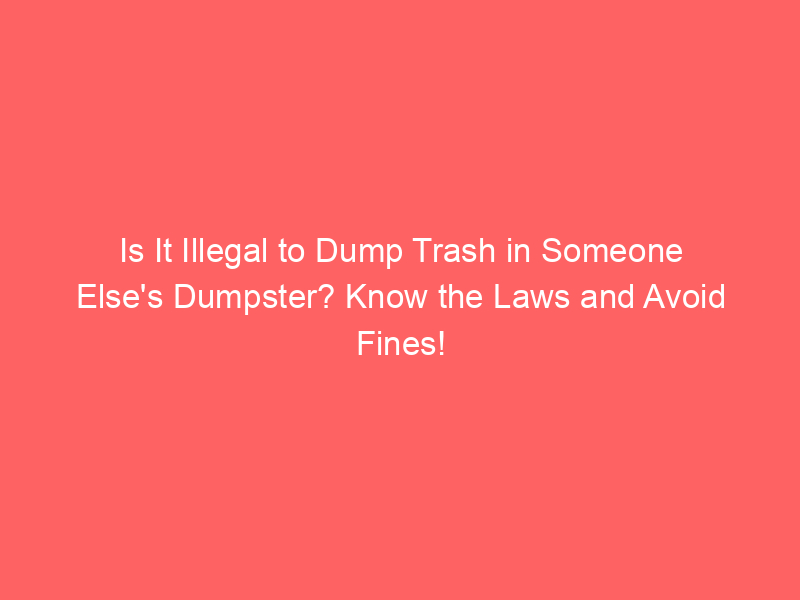When it comes to discarding your rubbish, you might think that an empty dumpster on someone else’s property looks like fair game. However, before you toss in your trash and dust off your hands, it’s crucial to understand the legalities and implications of such an action. Is it illegal to dump trash in someone else’s dumpster? Let’s dive deep into the laws governing dumpster use and disposal of waste so you can avoid fines and stay on the right side of the law.
Understanding Dumpster Laws
Dumpsters are typically rented by businesses or individuals who pay for both the rental unit and the waste management services. When you throw your garbage into another person’s dumpster without permission, you’re not only stealing a service they paid for but also potentially causing them additional costs or inconvenience.
The legality of using someone else’s dumpster varies by location since waste management is often governed by local ordinances. Generally speaking, unauthorized use of a dumpster can be classified under illegal dumping or theft of services.
Illegal Dumping: A Costly Offense
Illegal dumping refers to disposing of waste in non-designated areas, including another person’s dumpster. This is considered a criminal act in many jurisdictions. The consequences can range from fines and community service to even jail time for more serious offenses involving hazardous materials.
For instance, California Penal Code section 374.3 stipulates hefty fines for illegal dumping that can exceed $1,000 for first-time offenders and escalate with subsequent violations. In New York City, improper disposal can result in fines up to $20,000 per offense under the city’s administrative code.
Theft of Services: An Overlooked Transgression
In some areas, using someone else’s dumpster without permission could be prosecuted as theft of services. This means that you’re unlawfully benefiting from a utility service without paying for it—similar to cable theft or bypassing an electricity meter.
For example, Texas Penal Code classifies theft of services as ranging from a misdemeanor to a felony based on the value stolen (Sec. 31.04), which could mean significant penalties if caught using commercial dumpsters illicitly.
Avoiding Fines: Know Before You Toss
To stay clear of legal trouble:
- Always Ask Permission: If there’s a need to use someone else’s dumpster, get explicit consent from the owner.
- Understand Local Ordinances: Familiarize yourself with local regulations regarding waste disposal.
- Consider Other Options: Look into public disposal sites or hiring a junk removal service if necessary.
Remember that ignorance is not a defense when it comes to breaking these laws; saying “I didn’t know” won’t get you out of paying hefty fines or facing other penalties.
Real Cases: Cautionary Tales
There have been instances where individuals faced legal action due to unauthorized use of dumpsters:
- In Denver, Colorado, surveillance cameras captured people illegally dumping large items into business dumpsters leading to several citations.
- A Florida man was arrested after repeatedly using company dumpsters to dispose of personal construction debris.
These cases highlight how seriously municipalities take this issue and their willingness to prosecute offenders.
In Conclusion: Don’t Pay The Price For Convenience
Dumpster diving may seem harmless at first glance but understanding the potential legal ramifications is paramount—both for individuals looking for somewhere easy to dump their trash and businesses seeking protection against unauthorized use.
Before deciding that an open container is an invitation for free waste disposal, remember that respecting property rights and local laws isn’t just courteous—it’s mandatory unless you’re willing to risk fines or worse. Always explore legal avenues for disposing of your garbage responsibly; it will save money and hassle in the long run while keeping our communities clean and lawful!


